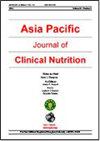中国青岛农村饮食中老年人的认知功能和常量营养素摄入量。
IF 1.3
4区 医学
Q4 NUTRITION & DIETETICS
Asia Pacific journal of clinical nutrition
Pub Date : 2022-03-01
DOI:10.6133/apjcn.202203_31(1).0013
引用次数: 0
摘要
背景与目的大量营养素提供的能量在健康衰老中起着关键作用。因此,本研究探讨了中国青岛农村老年人群中常量营养素与认知功能之间的关系。方法与研究设计本研究包括1504名来自中国青岛市李岔镇的65岁以上参与者。使用食物频率问卷测量饮食摄入量,并使用迷你精神状态检查评估认知功能。采用Logistic回归模型评估膳食常量营养素摄入与认知功能之间的关系。此外,应用限制性立方条来确定常量营养素比率与认知表现之间的剂量-反应关系。结果共纳入877名65岁以上的成年人。在调整加权多变量后,蛋白质和适度碳水化合物摄入与认知能力之间存在显著的正相关,但脂肪摄入与认知表现之间存在负相关。在计算每日能量供应比率后,脂肪和蛋白质摄入与认知功能之间的相关性相似。此外,蛋白质与碳水化合物的比率与认知功能呈U型关系(pnlinearity=0.674),而蛋白质与脂肪的比率呈L型,认知功能较低(pnlineality<0.001),对于低认知表现,最高四分位数的加权调整OR(95%CI)为0.509(0.314、0.827)。结论在充足的碳水化合物供应下,适当增加膳食蛋白质摄入量和减少脂肪摄入量可能有利于农村老年人的认知功能。本文章由计算机程序翻译,如有差异,请以英文原文为准。
Cognitive function and elderly macronutrient intakes from rural diets in Qingdao, China.
BACKGROUND AND OBJECTIVES
Energy provided by macronutrients plays a key role in healthy aging. This study therefore explored the association between macronutrients and cognitive function in elderly populations in rural areas of Qingdao, China.
METHODS AND STUDY DESIGN
This study included 1,504 participants over the age of 65 recruited from Licha Town, Qingdao City, China. Dietary intake was measured using the Food Frequency Questionnaire, and cognitive function was assessed using the Mini-Mental State Examination. Logistic regression models were used to evaluate the association between dietary macronutrient intake and cognitive function. In addition, restricted cubic bars were applied to determine the dose-response relationship between macronutrient ratios and cognitive performance.
RESULTS
A total of 877 adults over the age of 65 were included. After adjusting the weighted multiple variables, significant positive associations were revealed between protein and moderate carbohydrate intake and cognitive ability, but a negative association between fat intake and cognitive performance was identified. After calculating the daily energy supply ratio, similar associations were revealed between fat and protein intake and cognitive function. Furthermore, the ratio of proteins to carbohydrates had a U-shaped relationship with cognitive function (pnonlinearity=0.674), whereas the ratio of proteins to fats was L-shaped with lower cognitive function (pnonlinearity<0.001). Compared with the lowest quartile of the ratio of protein to fat intake, the weighted adjusted OR (95% CI) of the highest quartile was 0.509 (0.314, 0.827) for low cognitive performance.
CONCLUSIONS
With an adequate carbohydrate supply, appropriately increasing dietary protein intake and reducing fat intake might benefit the cognitive function of elders in rural areas.
求助全文
通过发布文献求助,成功后即可免费获取论文全文。
去求助
来源期刊
CiteScore
2.50
自引率
7.70%
发文量
58
审稿时长
6-12 weeks
期刊介绍:
The aims of the Asia Pacific Journal of Clinical Nutrition
(APJCN) are to publish high quality clinical nutrition relevant research findings which can build the capacity of
clinical nutritionists in the region and enhance the practice of human nutrition and related disciplines for health
promotion and disease prevention. APJCN will publish
original research reports, reviews, short communications
and case reports. News, book reviews and other items will
also be included. The acceptance criteria for all papers are
the quality and originality of the research and its significance to our readership. Except where otherwise stated,
manuscripts are peer-reviewed by at least two anonymous
reviewers and the Editor. The Editorial Board reserves the
right to refuse any material for publication and advises
that authors should retain copies of submitted manuscripts
and correspondence as material cannot be returned. Final
acceptance or rejection rests with the Editorial Board

 求助内容:
求助内容: 应助结果提醒方式:
应助结果提醒方式:


